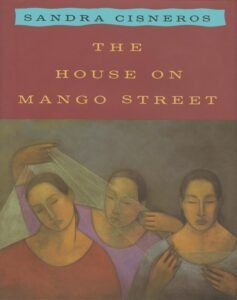 In the realm of Chicano literature, Sandra Cisneros’s “The House on Mango Street” stands out as a profound coming-of-age novel. That delves into the intricate tapestry of cultural identity within the Mexican-American community.
In the realm of Chicano literature, Sandra Cisneros’s “The House on Mango Street” stands out as a profound coming-of-age novel. That delves into the intricate tapestry of cultural identity within the Mexican-American community.
Buy from Amazon or try Audible audiobook for free
Through the eyes of the protagonist, Esperanza Cordero, readers are transported into a world where urban life and women’s experiences intertwine, shaping a powerful narrative of self-discovery and resilience.
Key Takeaways:
- The House on Mango Street is a renowned bildungsroman written by Sandra Cisneros.
- Through the character of Esperanza Cordero, the novel explores cultural identity and the challenges faced by Mexican-American women.
- Urban life and its impact on personal growth and self-discovery play a central role in the narrative.
- The power of storytelling is highlighted as Esperanza uses writing to reconcile her differences and gain confidence in her identity.
- The House on Mango Street serves as an inspirational testament to the transformative nature of embracing one’s cultural heritage.
The Importance of Identity in Esperanza’s Life
Esperanza’s journey in The House on Mango Street is a deeply personal exploration of her identity. As a young Chicana woman, she grapples with the complexities of her ethnicity, cultural inheritance, sexuality, and economic status. However, amidst these struggles, she discovers that her ability to tell stories is the most powerful and defining aspect of her identity.
Buy from Amazon or try Audible audiobook for free
In a world where she often feels unseen and unheard, writing becomes Esperanza’s refuge—a means through which she can embrace her background and embrace her individuality. Through her stories, she retains a sense of agency, reclaiming her narrative and challenging the limitations imposed upon her. Her ability to tell stories becomes a source of empowerment, enabling her to navigate and transcend the obstacles she faces.
“I put it down on paper and then the ghost does not ache so much…. Writing makes me forget…. I forget to go to the bathroom, forget to comb my hair, forget to eat….” – Esperanza Cordero, The House on Mango Street
In embracing her ability to tell stories, Esperanza showcases the resilience and strength that enable her to navigate the intricacies of her identity. She recognizes that her cultural inheritance, though complex, is an integral part of who she is and informs her unique perspective. Through her storytelling, she weaves together the threads of her heritage, finding solace, understanding, and a sense of belonging.
In a society that often categorizes individuals based on their economic status, sexuality, or background, Esperanza’s ability to shape her story becomes a powerful act of self-determination. It allows her to transcend the limitations that society imposes, creating a space where her identity can flourish and evolve. Through storytelling, Esperanza boldly asserts her agency and reminds us of the immense power that lies within our ability to shape our own narratives.
Embracing Individuality through Storytelling
While society may attempt to define us based on external factors, The House on Mango Street attests to the transformative power of embracing our individuality. Esperanza’s journey teaches us that our ability to tell stories is not only an expression of our identity but also a means of self-discovery and resilience.
Buy from Amazon or try Audible audiobook for free
Through storytelling, we have the opportunity to reclaim our narratives, challenge societal norms, and celebrate the complexities of our cultural backgrounds. It is the act of storytelling that allows us to break free from the constraints placed upon us and forge a path that is uniquely our own.
The Evolution of Esperanza’s Identity
The House on Mango Street is a powerful coming-of-age novel that explores the theme of identity, particularly the transformation of the protagonist, Esperanza Cordero. Throughout the novel, Esperanza’s identity evolves from that of a shy and uncertain young girl to that of a more confident and self-assured individual.
Esperanza’s journey of self-discovery begins in the first chapter of the novel. She introduces herself as a young Latina living on Mango Street, recounting her experiences and observations in a series of vignettes. At this point, Esperanza lacks confidence in herself and her abilities, mirroring the challenges many individuals face in their formative years.
Buy from Amazon or try Audible audiobook for free
As the novel progresses, Esperanza’s encounters with her neighbors, friends, and the broader community shape her identity. Through her interactions, she discovers her passion for writing and storytelling. Which becomes a means of self-expression and empowerment. Writing allows Esperanza to explore her thoughts and emotions. Helping her navigate the complexities of her cultural heritage, gender, ethnicity, and economic status.
“I put it down on paper and then the ghost does not ache so much. I write it down and Mango says goodbye sometimes. She does not hold me with both arms. She sets me free.”
Transformation
Esperanza’s transformation becomes evident in the last chapter of the novel. She confidently asserts her desire to leave Mango Street behind and pursue her dreams elsewhere. Symbolizing her growth and development throughout the narrative. Esperanza’s evolution highlights the resilience and strength she gains from embracing her identity and asserting her voice.
By the end of “The House on Mango Street,” Esperanza’s journey explores the diverse facets of identity and emphasizes the importance of embracing change and growth. Through her experiences, readers are reminded of the power of self-discovery. And the resilience that comes from accepting one’s cultural heritage and unique identity.
Buy from Amazon or try Audible audiobook for free

Continue reading to discover the symbolism behind names in the novel and how altering certain aspects of Esperanza’s identity would impact the overall narrative.
The Symbolism of Names and Identity on Mango Street
In “The House on Mango Street,” Esperanza’s desire to change her name reflects her quest for a new identity. She feels that her given name doesn’t fully represent who she is. She longs for a name like Zeze the X, which she believes would better align with her identity and empower her. The symbolism of names in the novel highlights the profound importance of identity and the profound impact our names can have on how we perceive ourselves.
“A name like Zeze the X would mean something. I could talk to bums and do what I want. Be invisible.”
Esperanza’s yearning for a name that carries weight and significance echoes the universal human need for self-expression and autonomy. Through her desire to change her name, she challenges societal expectations and embraces the power of personal choice. And seeks to redefine her own identity beyond the limitations imposed by her given name.
The Transformative Power of Names
The names in “The House on Mango Street” serve as symbols of identity and self-discovery. Illustrating the characters’ desires for change and the search for individuality. While some characters, like Esperanza, yearn for different names to shape their identities, others, like Sally, change their names to escape their current realities. The act of changing names becomes a symbolic representation of the characters’ desire for transformation and liberation.
Buy from Amazon or try Audible audiobook for free
The symbolism of names in the novel resonates beyond Esperanza’s personal desire for a new identity. It invites readers to reflect on the significance of their own names and the role they play in shaping their identities. Names carry cultural, familial, and personal histories, and they serve as a powerful tool for self-expression and recognition.

By exploring the profound symbolism of names and identity, “The House on Mango Street” invites readers to question the societal constructs that define and confine us. It encourages introspection and fosters empathy, demonstrating the complexity of human identity and the constant need for self-discovery and self-actualization.
Exploring the Possibility of Altering Identity on Mango street
The House on Mango Street raises thought-provoking questions about the impact of altering the protagonist’s identity on the narrative. Would changing Esperanza’s gender, race, age, or sexual orientation dramatically transform the story? How would these changes affect the overarching message of the novel? In contemplating these inquiries, readers are encouraged to reflect on the intricate relationship between identity and storytelling.
Understanding Identity’s Narrative Impact
In The House on Mango Street, Esperanza’s identity plays a central role in shaping her experiences and interactions. The novel invites readers to consider how altering key aspects of her identity could disrupt the narrative’s dynamic. Would a different gender or race significantly affect Esperanza’s perspective and the challenges she faces? How might changing her age or sexual orientation alter her coming-of-age journey? These hypothetical scenarios shed light on the intricacies of identity and its influence on storytelling.
Buy from Amazon or try Audible audiobook for free
“The possibilities of altering Esperanza’s identity prompt readers to ponder the power of narrative transformation and the profound impact that personal characteristics have on an individual’s story.”
Identity’s Role in Conveying the Novel’s Message
The House on Mango Street communicates its underlying message through the lens of Esperanza’s identity. By immersing readers in her unique experiences, the novel offers insights into the struggles faced by marginalized individuals. Altering Esperanza’s identity would inevitably reshape the story’s perspective, potentially leading to a reevaluation of the novel’s fundamental themes. This exploration showcases the intricate connection between identity, storytelling, and the ability to convey powerful messages through literature.
“The House on Mango Street challenges readers to consider how altering the protagonist’s identity would shape the narrative, encouraging deeper reflections on the complex relationship between personal experiences and storytelling.”
The Impactful Engagement of Identity and Narrative
The House on Mango Street cultivates a dialogue on the intricate interplay between identity and storytelling. By examining the potential consequences of altering the protagonist’s identity, the novel prompts readers to examine their own understanding of the role identity plays in shaping personal narratives. Through the lens of Esperanza’s story, readers are invited to appreciate the power of storytelling in both reflecting and shaping individual and collective identities.
- Would changing Esperanza’s gender significantly alter the challenges she faces and her perspective on them?
- How might altering her race or ethnicity shape her experiences on Mango Street?
- Could a different sexual orientation transform her interactions with others and influence her journey of self-discovery?
- What impact might changing her age have on her coming-of-age narrative?
Exploring the profound implications of altering Esperanza’s identity fosters a deeper understanding of the complex relationship between identity, storytelling, and the transformative power of literature. The House on Mango Street encourages readers to reflect on their own identities and the narratives they construct, opening doors to new perspectives and insights.
Buy from Amazon or try Audible audiobook for free
Conclusion of Mango street
“The House on Mango Street” is a captivating coming-of-age novel that delves into the complex theme of identity and self-discovery. Through the character of Esperanza Cordero, author Sandra Cisneros artfully explores the resilience and cultural heritage of the Mexican-American community.
Esperanza’s journey is a testament to the transformative power of storytelling in shaping individual and collective identities. As she grapples with her ethnicity, gender, cultural heritage, and economic status, Esperanza discovers the power of her own voice through writing. It becomes her means of self-expression and a way to overcome the challenges she faces.
Throughout the novel, readers are reminded of the importance of resilience in the face of adversity. Esperanza’s determination to define herself on her own terms shows her unwavering spirit, which is a source of inspiration for readers of all backgrounds. By embracing her cultural heritage and staying true to herself, Esperanza ultimately finds the strength to forge her own path and discover her true identity.
Buy from Amazon or try Audible audiobook for free
In “The House on Mango Street,” Sandra Cisneros beautifully captures the universal journey of self-discovery and the power of cultural heritage. This thought-provoking novel invites readers to reflect on their own identities, celebrating the rich tapestry of experiences that make us who we are.
The House on Mango street FAQ
What is “The House on Mango Street” about?
“The House on Mango Street” is a coming-of-age novel by Sandra Cisneros. It follows the story of Esperanza Cordero as she navigates her cultural identity and place in the world.
How does identity play a role in Esperanza’s life?
Esperanza must grapple with various aspects of her identity, including her ethnicity, gender, cultural heritage, sexuality, and economic status. These elements shape her experiences and influence her journey of self-discovery.
How does Esperanza’s identity evolve throughout the novel?
What is the symbolism of names in the novel?
Esperanza’s desire to change her name reflects her quest for a new identity. The novel explores how names can shape our perception of ourselves and the impact they have on our sense of identity.
How does the novel explore the possibility of altering identity?
“The House on Mango Street” raises questions about how changing certain aspects of Esperanza’s identity, such as her gender, race, age, or sexual orientation, would impact the narrative and the overarching message of the story.

Leave a Reply